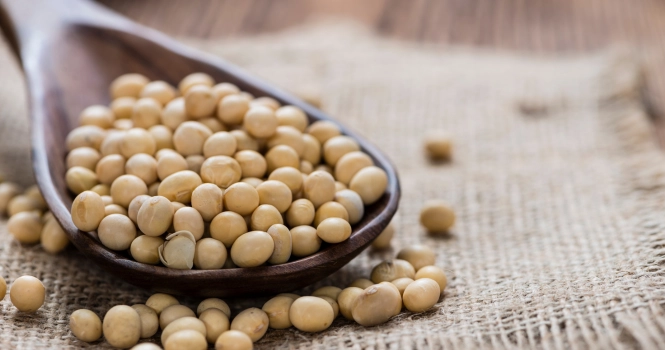Discovering the Power of Soy Protein in Nutrition

Soy protein, derived from soybeans, stands as a pivotal component in the realm of nutrition, offering a versatile and plant-based protein option. Renowned for its high-quality protein content, it contains all nine essential amino acids, making it one of the few complete plant-based proteins.
This has cemented its place as a crucial ingredient for vegetarians, vegans, and those seeking alternative protein sources.
What is Soy Protein?
Soy protein is extracted from the soybean, a legume native to East Asia but now cultivated globally. The process involves dehulling and defatting soybeans, leading to three main forms of soy protein products:
- Soy protein isolate
- Soy protein concentrate
- Textured soy protein.
Each form varies in protein content, dietary fiber, and uses in food products and supplements.
Historical Background
The use of soybeans dates back thousands of years in Asian cuisines and traditional medicines. However, the extraction and commercial use of soy protein as we know it today began in the early 20th century. The motivation was to find efficient ways to feed a growing population and utilize soybeans’ nutritional value more effectively.
Rise in Popularity
It’s popularity in Western diets surged in the latter half of the 20th century, paralleling the rise of health-conscious eating trends and vegetarianism. Its ability to seamlessly integrate into various dishes without altering flavor profiles, combined with growing awareness of its health benefits, has made soy protein a staple in health food products.
From protein bars and shakes to meat substitutes and dairy-free products, it’s versatility and nutritional benefits have secured its place in a wide array of dietary preferences.
The evolution of soy protein from a humble bean to a key player in global nutrition highlights its adaptability and enduring relevance in dietary practices worldwide. Its role in supporting sustainable eating habits and providing nutritional solutions continues to expand, making it an indispensable part of modern diets.
Nutritional Profile
It is celebrated for its comprehensive nutritional profile, encompassing essential macronutrients and micronutrients beneficial for overall health. Its role in various dietary regimes is supported by its ability to aid in muscle maintenance, promote heart health, and potentially regulate hormones.
Nutritional Content
- Protein: It is a high-quality, complete protein, meaning it provides all nine essential amino acids necessary for human health. This makes it an excellent protein source for muscle repair and growth, especially important for athletes, bodybuilders, and those in muscle recovery.
- Fats: Soybeans naturally contain fats, but soy protein products, especially isolates, have most of the fat removed. The fats present in soy are mostly unsaturated, including omega-3 fatty acids, which are beneficial for heart health.
- Carbohydrates: The products typically have a lower carbohydrate content, making them suitable for low-carb diets. However, they do contain dietary fiber, particularly soy protein concentrates and textured soy protein, aiding in digestion and satiety.
- Vitamins and Minerals: It is a good source of vitamins and minerals, including B vitamins, iron, calcium, magnesium, and phosphorus, contributing to a range of bodily functions from energy metabolism to bone health.
Health Benefits
- Muscle Maintenance and Growth: The high-quality protein in soy supports muscle synthesis, making it an effective component in post-workout recovery and muscle-building diets.
- Heart Health: It can contribute to cardiovascular health by lowering LDL (bad) cholesterol levels, reducing the risk of heart disease. The presence of omega-3 fatty acids in soy also supports heart health by improving lipid profiles.
- Weight Management: The protein and fiber in soy can enhance feelings of fullness, helping to reduce overall calorie intake and support weight loss or maintenance efforts.
- Hormonal Regulation: Isoflavones in soy protein have been studied for their potential to regulate hormones, particularly estrogen. They may offer relief from menopausal symptoms and protect against certain hormone-related cancers, although research is ongoing and results are mixed.
- Bone Health: Some studies suggest that soy protein, rich in calcium and magnesium, may have a positive effect on bone density, particularly beneficial for postmenopausal women at risk of osteoporosis.
Considerations
While it offers numerous health benefits, it’s important to consume it as part of a balanced diet. Individuals with soy allergies or sensitivities should avoid soy protein, and those with specific health conditions should consult healthcare professionals before making significant dietary changes.
Types and Culinary Applications
It is available in various forms, each with unique characteristics that make them suitable for different culinary applications. Understanding these forms can help you incorporate soy protein into your meals creatively and effectively.
Types of Soy Protein
- Soy Protein Isolate: This is the most refined form of soy protein, containing about 90% protein. It’s made by removing most of the fats and carbohydrates from defatted soy flour. Soy protein isolate has a neutral flavor and a smooth texture, making it an excellent addition to shakes, smoothies, and sports nutrition products.
- Soy Protein Concentrate: Containing about 70% protein, soy protein concentrate retains more of the natural fibers found in soybeans. It’s less processed than isolate, with a slightly stronger taste and a denser texture. It’s used in baked goods, cereals, and some meat substitutes.
- Textured Soy Protein (TSP) or Textured Vegetable Protein (TVP): TSP or TVP mimics the texture of meat and is about 50% protein. It’s often used in vegetarian and vegan cooking as a meat substitute in dishes like burgers, chili, and tacos.
Culinary Applications
Incorporating it into daily meals can be both easy and versatile. Here are some ideas and tips for using each type in your cooking:
- Smoothies and Shakes: Blend soy protein isolate into smoothies or shakes for a protein boost. It’s especially great for post-workout recovery drinks due to its high protein content and easy digestibility.
- Baking: Use soy protein concentrate to add protein to baked goods like bread, muffins, and pancakes. It can partially substitute flour in recipes, enhancing the nutritional profile without significantly altering the taste or texture.
- Meat Substitutes: Rehydrate TSP or TVP with water or vegetable broth to use as a ground meat substitute in recipes like spaghetti bolognese, vegetarian chili, or tacos. Season it as you would with meat, and enjoy a high-protein, vegetarian-friendly dish.
- Salads and Soups: Add hydrated TSP/TVP to salads for a protein boost or incorporate it into soups and stews as a meat alternative. It absorbs flavors well, making it a versatile ingredient in various savory dishes.
- Energy Bars and Snacks: Incorporate soy protein isolate into homemade energy bars or protein balls for a nutritious, on-the-go snack. Combine it with ingredients like oats, nuts, seeds, and dried fruit for a balanced and tasty treat.
Preparation Tips
- When using soy protein isolate in liquid recipes, ensure to blend it thoroughly to avoid clumps.
- Soy protein concentrate can be used to thicken sauces and soups, adding both texture and nutritional value.
- Before cooking with TSP/TVP, rehydrate it in warm water or broth for about 10-15 minutes, or until it’s soft and plump, then drain any excess liquid.
By exploring the different forms of soy protein and experimenting with them in various dishes, you can enhance the nutritional content of your meals and enjoy the diverse flavors and textures that soy protein offers. Whether you’re a dedicated vegetarian or just looking to diversify your protein sources, soy protein provides a flexible and healthful option for any diet.
Debunking Myths and Addressing Concerns
Soy protein, despite its nutritional benefits, has been surrounded by various myths and concerns. It’s crucial to address these with evidence-based information to understand soy protein’s true impact on health.
Myth 1: Soy Protein Causes Hormonal Imbalance
Hormonal Effects: One of the most prevalent myths is that soy protein negatively affects hormone levels due to its isoflavones, which can mimic estrogen.
However, numerous studies have shown that consuming moderate amounts of soy protein does not have harmful effects on hormone levels in men or women. In fact, isoflavones may offer protective benefits against certain hormone-related cancers.
Myth 2: Soy Protein is Unsuitable for Men
Impact on Men: Concerns about soy protein feminizing men or reducing testosterone levels have been debunked by scientific research. Clinical studies indicate that soy consumption does not significantly affect male hormone levels or fertility.
Myth 3: Soy Increases the Risk of Breast Cancer
Breast Cancer: There’s a misconception that soy’s phytoestrogens might increase the risk of breast cancer. Contrarily, research suggests that soy protein, when consumed as part of a balanced diet, may actually reduce the risk of breast cancer and improve survival rates in breast cancer patients, likely due to the protective effects of isoflavones.
Myth 4: All Soy Products are Genetically Modified (GMO)
GMO Concerns: While it’s true that a significant portion of soybeans grown worldwide are genetically modified, non-GMO soy products are widely available. Consumers concerned about GMOs can look for certified organic or non-GMO verified soy protein products to ensure they are avoiding genetically modified ingredients.
Clarifications on Health Impact
- Heart Health: The FDA has recognized that 25 grams of soy protein per day, as part of a diet low in saturated fat and cholesterol, may reduce the risk of heart disease. Soy protein can lower LDL (bad) cholesterol levels, contributing to improved cardiovascular health.
- Bone Health: Isoflavones in it might have a positive effect on bone health, particularly in postmenopausal women, potentially reducing the risk of osteoporosis.
- Weight Management: It can promote satiety and help in weight management, making it a valuable component of a diet aimed at weight loss or maintenance.
The myths surrounding soy protein are often based on misconceptions and misinterpretation of scientific data.
Evidence-based research has shown that soy protein, when consumed in moderation as part of a varied diet, offers numerous health benefits without adversely affecting hormone levels or cancer risk.
Whether incorporated into a vegetarian, vegan, or omnivorous diet, it can be a valuable and safe component of a balanced nutritional plan.











